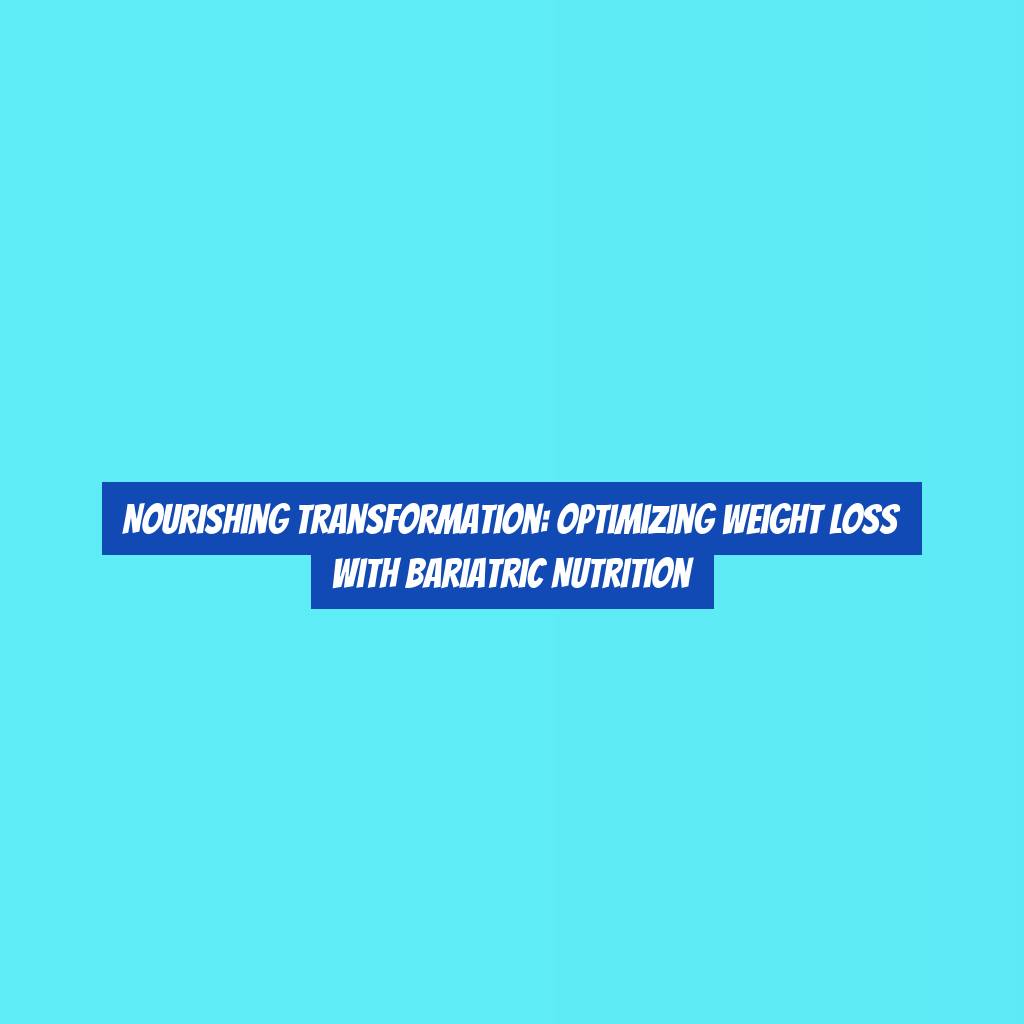Nourishing Transformation: Optimizing Weight Loss with Bariatric Nutrition
YouG??ve probably tried countless diets and weight loss programs, but when it comes to truly transforming your body and health, bariatric nutrition offers a level of optimization that other methods canG??t match.
The journey to sustainable weight loss after bariatric surgery is not just about what you eat, but about how you nourish your body for lasting transformation.
Understanding the intricacies of bariatric nutrition and its impact on weight loss can be the key to unlocking your path to a healthier, more fulfilling life.
Understanding Bariatric Nutrition
When starting on your bariatric nutrition journey, itG??s essential to understand the specific dietary needs and adjustments required for successful weight loss. This journey isnG??t just about eating less; itG??s about eating right.
After bariatric surgery, your body undergoes significant changes, and so must your approach to nutrition. YouG??ll need to focus on getting enough protein to support healing and preserve muscle mass. This means incorporating lean meats, eggs, dairy, and plant-based protein sources into your meals.
YouG??ll also need to prioritize hydration and choose nutrient-dense foods to meet your bodyG??s needs while consuming fewer calories. Understanding portion control is crucial, as your smaller stomach will require smaller, more frequent meals.
Learning to eat slowly and mindfully will help prevent discomfort and promote better digestion. Additionally, vitamin and mineral supplementation will be necessary to prevent deficiencies.
Working closely with a registered dietitian will ensure that youG??re meeting your nutritional needs and making the most of your bariatric journey.
Key Nutritional Considerations Post-Surgery
After undergoing bariatric surgery, your bodyG??s nutritional needs will shift significantly, requiring careful attention to key considerations for successful post-surgery recovery and weight loss. ItG??s crucial to prioritize the following nutritional aspects to support your health and weight loss journey:
-
Protein Intake: Focus on consuming lean proteins to support healing and preserve muscle mass. Aim for at least 60-80 grams of protein per day to meet your bodyG??s increased demands.
-
Micronutrient Supplementation: Due to decreased food intake and potential malabsorption, itG??s essential to supplement with vitamins and minerals such as iron, calcium, vitamin D, and B vitamins to prevent deficiencies.
-
Hydration: Drink plenty of water throughout the day to stay hydrated and aid in digestion. Limiting sugary and carbonated beverages is crucial for weight loss and overall health.
-
Balanced Eating: Strive for a diet rich in fruits, vegetables, and whole grains to ensure adequate fiber intake and promote satiety. Avoid high-calorie, low-nutrient foods to support weight loss while meeting nutritional needs.
Building a Balanced Bariatric Meal Plan
To create a balanced bariatric meal plan, focus on incorporating lean proteins, nutrient-dense fruits, and vegetables, and whole grains to support your post-surgery nutritional needs and weight loss goals.
Lean proteins such as skinless poultry, fish, tofu, and legumes are essential for muscle repair and growth, which is crucial after bariatric surgery.
Aim to fill half of your plate with non-starchy vegetables like spinach, kale, broccoli, and peppers to maximize nutrient intake and promote satiety.
Additionally, including a variety of colorful fruits can provide essential vitamins, minerals, and fiber to support your overall health.
When incorporating whole grains into your meal plan, opt for options like quinoa, brown rice, and whole grain bread to ensure sustained energy levels and proper digestion.
ItG??s important to focus on portion control and mindful eating to prevent overeating and promote weight loss.
Breaking your meals into smaller, more frequent portions throughout the day can help manage hunger and prevent excessive caloric intake.
As you build your bariatric meal plan, strive for variety and balance to ensure youG??re meeting your nutritional needs while enjoying a diverse range of flavors and textures.
Navigating Nutritional Challenges
As you move forward with your bariatric nutrition journey, addressing and overcoming potential nutritional challenges becomes essential for sustaining your weight loss and overall well-being. Navigating these challenges can sometimes be daunting, but with the right strategies, you can ensure that you continue to meet your nutritional needs while achieving your weight loss goals.
Here are four key strategies for navigating nutritional challenges:
-
Monitoring Micronutrient Levels: Regularly monitoring your vitamin and mineral levels through blood tests can help you identify any deficiencies and allow for timely intervention.
-
Mindful Eating: Practicing mindful eating techniques, such as chewing food thoroughly and eating slowly, can help prevent discomfort and ensure proper nutrient absorption.
-
Supplementation: In consultation with your healthcare provider, incorporating supplements such as multivitamins, calcium, vitamin D, and B12 can help bridge any nutritional gaps.
-
Meal Planning and Preparation: Taking the time to plan and prepare balanced meals in advance can help you stay on track with your nutritional needs and avoid relying on convenience foods that may be lacking in essential nutrients.
Sustaining Long-Term Nutritional Success
Navigating potential nutritional challenges and maintaining a balanced diet is crucial for sustaining long-term weight loss success after bariatric surgery. After surgery, your bodyG??s ability to absorb nutrients changes, making it essential to follow a personalized nutrition plan.
Prioritize lean protein, vegetables, fruits, and whole grains to meet your nutritional needs while keeping calories in check. Emphasize small, frequent meals to aid in digestion and prevent nutrient deficiencies. Remember to chew your food thoroughly and avoid drinking with meals to prevent discomfort and promote optimal nutrient absorption.
Supplements play a vital role in your long-term nutritional success. Your healthcare team will likely recommend a regimen tailored to your individual needs, including vitamins, minerals, and possibly protein supplements. Compliance with these recommendations is crucial for preventing deficiencies and ensuring your overall well-being.
Regular monitoring and follow-ups with your healthcare team are key to sustaining nutritional success. These appointments allow for adjustments to your nutrition plan as your body continues to adapt post-surgery. Stay mindful of your eating habits, listen to your bodyG??s cues, and seek support when needed.
Sustaining long-term nutritional success requires dedication, but the benefits to your health and well-being make it worthwhile.
Conclusion
In conclusion, bariatric nutrition plays a crucial role in optimizing weight loss after surgery. By understanding key nutritional considerations, building a balanced meal plan, and navigating challenges, you can sustain long-term success.
Remember to consult with a registered dietitian for personalized guidance and support on your journey to a healthier and nourished transformation.
Keep making mindful food choices and staying committed to your nutritional goals for continued success.



